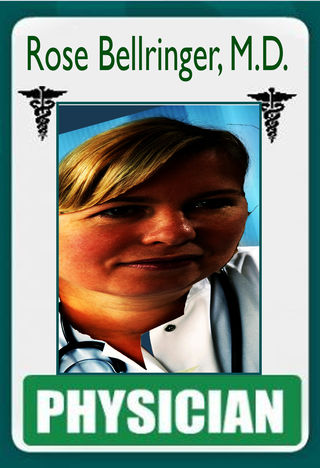Relationships
Unable to Bury a Dead Love
Vacating terms of codependency, part one.
Posted June 27, 2017

Meet Tucker and Rose Bellringer. After 30 years of marriage, Tucker and Rose hate each other.
From Wrangled Roots
Rose was born in the U.S. to Guatemalan nationals. Shortly, after that, her mother abandoned the family, and her father drank himself to death before Rose finished Med-School. She’s inspirational and gifted, but also, overweight and dresses like a vacationing nun.

Tucker’s life is where the American Dream went to die a slow, ugly death. His father made big deals on the golf course while basking in White Privilege—knee deep in opportunistic women. Tucker’s mom, Mary Katherine, was a size four but died from diet pill abuse maintaining that size. Meanwhile, Tucker was accumulating 300 undergraduate units and no degree before dropping out of USC.
Grew a twisted tree
For years, Tucker hid from his life by picking up the pieces of Rose’s chaotic existence. Rose used her marriage to well-bred, Teutonic, Tucker to compensate for being overweight and from a subordinate culture - similar to how a rich, old spinster might cover her imperfections with rare gems and precious metals that sparkle and shine.
That is about to fall
Things have changed. Tucker now owns a lucrative surf academy, and he’s loving it. He no longer needs to hideout in Rose’s life. Rose has changed too. She left LA’s best hospital to work for a free clinic in East LA at half the pay for twice as many hours. Rose is happier here than she was at her previous job because she no longer needs the prestige of an uptown job on her resume, or an uptown white man on her arm, to feel worthy. She is finally embracing her culture and her journey. These are all positive changes. Their love should be getting stronger but instead, it is dead and just not buried. Why?
Inside Tucker’s Brain

Tucker's mom's prolonged stress caused excess glucocorticoid release, which crossed the placenta and remodeled Tucker’s Hypothalamic Pituitary Adrenal (HPA) axis when she was pregnant with him.[1] The HPA is the transmission and engine of the stress response. Changes to Tucker’s HPA permanently affected his emotional dynamics and stress regulation.[2]
Thus, Tucker is hyper vigilant, volatile, and prone to worry and rumination. He spends many nights terrorized by notions that are less plausible than Queen Elizabeth leaving Prince Phillip for Wanda Sykes... but, why?
Anticipating danger is a protective measure. Wondering, “What if this or that happens…” is fine as long as the brain finishes the process, i.e., “…then I will do this or do that.” However, Tucker’s brain doesn’t finish the process, and preparing for danger becomes useless worrying, which can promote rumination, anxiety, and depression. Thus, Tucker’s brain gets caught in a cortex-loop and keeps spinning like a broken vinyl record—“What if, what if, what if…” This thought process works him into a frenzy, but at the same time creates the erroneous feeling that he is proactive because the brain presumes when the “what if this or what if that" thoughts occur, the “then I will do this or that” plan will follow.[3] However, in reality, what he is doing is as useless and unproductive as the foot soldier at Little Big Horn, who is running around screaming, "we are surrounded by Indians" over and over again, as opposed to loading his rifle and taking aim, like his comrades, who all know they are surrounded by Indians.
Misinterpreting cues is an occupational hazard for our old mammal brain in our high-tech world. Even though it is a misinterpretation, it feels accurate to Tucker, but feelings are not facts. So, when Rose refuses to indulge his rumination and excessive worry, he feels assaulted. Again, feelings are not facts, but you can't tell that to subcortical brain structures where emotions occur because the mantra in the old brain is "survive now, ask questions later." So Tucker becomes volatile, violent, and extremely psychologically and emotionally brutal to Rose because of developmental compromises to his neuroanatomy. Additionally, he has a great deal of frustration for the many years he wasted jumping from job to job and Rose-crisis to Rose-crisis. It is simply too psychically painful for him to accept that he was too cowardly to live his life, until now. So, he writes the history and blames Rose for everything. This new history is Tucker's justification for abusing Rose.
Inside Rose’s Brain

Poverty, emotional, psychological, social, and paternal abuse has taken its toll on the neuroanatomy of Rose's emotion as well. Rose’s father over-indulged her with one hand and molested her with the other. Likewise, Tucker ran hot and cold—but that’s why she’s here. She came for the pedigree but stayed for the co-dependency. The brain observes its early environment and wires itself accordingly to thrive in a world based on those observations.[4-7] Naturally, she was drawn to Tucker, who was as drunk on insecurity and as unavailable as her alcoholic father was.

Rose is depressed and emotionally volatile as well, though she expresses it differently than Tucker, less screaming, more surreptitious mind games. She know's Tucker well, and Tucker's vulnerabilities even better. She'll stab his psyche and then scoff while he is psychically hemorrhaging. Make no mistake about it - Rose is just as angry and bitter as Tucker is, and can be just as irrational and mean because of it. Why?
Clinical environments are epicenters of size, race, and age bigotry, while the apotheosis of MD’s abounds within them. Even though she is more appreciated in her new job, it's still a clinical environment, and she still faces bigotry. Also, while she's happier here than she was at the LA's largest, most prestigious hospital, she resents feeling compelled to make the change because of the bigotry she endured.
Bigotry depends on stereotyping. Stereotypes exist because the brain is busy processing three trillion commands per second, and must consolidate and simplify information to survive. So, it detests change, as much as cashiers hate price checks. Rose violates many stereotypes by being an excellent, overweight, female, Guatemalan physician.
When people violate a stereotype, the brain blames the person, not its inadequacies. Thus, Rose is very disturbing to her co-workers emotionally, regardless of what they think intellectually. Emotion is subcortical, where the mantra is “survives now and ask questions later.” Thinking is not a subcortical option, and the cortex doesn’t have sufficient jurisdiction to intervene. So her co-workers treat her horribly without even being aware of it. Given her history, her neuroanatomical emotional constellates, predispose her to hurt more and longer than most people. [4, 8-12]
Instead of comforting her, Tucker acrimoniously says, “you’re playing the race card.” So Rose lies there, angry, bitter, and hurt, into the wee hours feeding a depression that has gorged itself on her life forever.
Why don't they split up? They do not love each other; they don't even like each other. They have different values and value different things in life. They probably won't split up because the brain is resistant to change - especially the unhealthy brain. Her brain is wired on the belief that the world is abusive and she is a helpless victim; Tucker is still facilitating that. As for Tucker, he still needs a place to hide. So now, instead of hiding in Rose's chaos, which is gone, he hides in his rage. The bottom line, she's the woman he loves to hate, and he's the man she loves to loathe. They cannot bury their love because it is not dead. Hate is not the opposite of love, indifference is. However, change is going to come, stay tuned… and Remain Fabulous and Phenomenal.
Join my email list to receive notifications of new posts
References
1. Reynolds, R.M., Glucocorticoid excess and the developmental origins of disease: two decades of testing the hypothesis--2012 Curt Richter Award Winner. Psychoneuroendocrinology, 2013. 38(1): p. 1-11.
2. Laborie, C., et al., Maternal perinatal undernutrition has long-term consequences on morphology, function and gene expression of the adrenal medulla in the adult male rat. J Neuroendocrinol, 2011. 23(8): p. 711-24.
3. Korb, A., The Upward Spiral. 2015 New Harbinger Publications.
4. McEwen, B.S., Stress and hippocampal plasticity. Annu Rev Neurosci, 1999. 22: p. 105-22.
5. McEwen, B.S., Hormones as regulators of brain development: life-long effects related to health and disease. Acta Paediatr Suppl, 1997. 422: p. 41-4.
6. McEwen, B.S., Hormones and the plasticity of neurons. Clin Neuropharmacol, 1992. 15 Suppl 1 Pt A: p. 582A-583A.
7. McEwen, B.S., Early life influences on life-long patterns of behavior and health. Ment Retard Dev Disabil Res Rev, 2003. 9(3): p. 149-54.
8. Glaser, D., Child abuse and neglect and the brain--a review. J Child Psychol Psychiatry, 2000. 41(1): p. 97-116.
9. Gordillo, F., et al., [The role of experience in the neurology of facial expression of emotions]. Rev Neurol, 2015. 60(7): p. 316-20.
10. McEwen, B.S., Brain on stress: how the social environment gets under the skin. Proc Natl Acad Sci U S A, 2012. 109 Suppl 2: p. 17180-5.
11. McEwen, B.S., Protective and damaging effects of stress mediators: central role of the brain. Dialogues Clin Neurosci, 2006. 8(4): p. 367-81.
12. McEwen, B.S. and L. Getz, Lifetime experiences, the brain and personalized medicine: an integrative perspective. Metabolism, 2013. 62 Suppl 1: p. S20-6.




